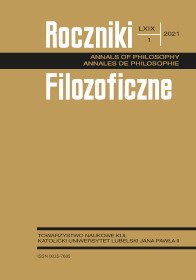Descartes, Kant, and Swinburne on Human Soul
Abstract
This paper addresses two issues in Richard Swinburne’s book Are We Bodies or Souls? I interpret Swinburne’s modal argument as an example of a priori synthetic knowledge. Swinburne’s thesis that every person possesses “thisness” is compared with Kant’s distinction between the empirical character and the intelligible character.
References
Aristotle. Generation of Animals. Translated by A. L. Peck. London: Heinemann, 1940.
Bocheński, Joseph M. The Methods of Contemporary Thought. Dordrecht: Reidl, 1965.
Bolzano, Bernard. Athanasia oder die Gründe für die Unsterblichkeit der Seele. In Bernard Bolzano. Ausgewählte Schriften, edited by Eduard Winter. Berlin: Union, 1976.
Broad, C. D. Mind and its Place in Nature. London: Kegan Paul, 1925.
Butchvarov, Panayot. The Concept of Knowledge. Evanston, IL: Northwestern University Press, 1970.
Descartes, René. The Meditations and Selections from the Principles of René Descartes. Translated by John Veitch. Chicago: Open Court, 1903.
Hartmann, Nicolai. Philosophie der Natur. Abriss der speziellen Kategorienlehre. Berlin: De Gruyter, 1950.
Kemp Smith, Norman. Immanuel Kant’s Critique of Pure Reason. London: Macmillan, 1929.
Putnam, Hilary. “Analyticity and Apriority: Beyond Wittgenstein and Quine.” In Philosophical Papers, vol. 3, Realism and Reason, edited by Hilary Putnam, 113–38. Cambridge: CUP, 1983.
Spiegelberg, Herbert. The Phenomenological Movement. A Historical Introduction. 3rd ed. The Hague: Nijhoff, 1982.
Swinburne, Richard. Are We Bodies or Souls? Oxford: OUP, 2019.
Copyright (c) 2021 Roczniki Filozoficzne

This work is licensed under a Creative Commons Attribution-NonCommercial-NoDerivatives 4.0 International License.





